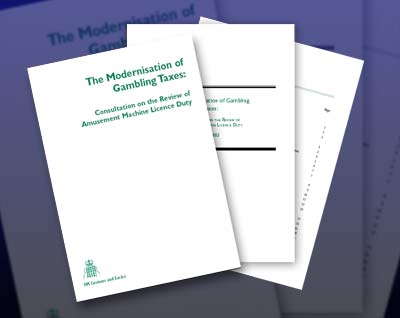
|
DOING
YOUR DUTY
|
|
Story dated 18 July, 2003 The UK Government is planning reforms to the way amusement and gambling machines are taxed and it is looking for views of interested parties; and that might include you as machine players. In its consultation document entitled "The Modernisation of Gambling Taxes: Consultation on the Review of Amusement Machine Licence Duty", Her Majesty's Customs & Excise explain a suggested way to remove the current Amusement Machine Licence Duty (AMLD) and replace it with a tax based on machine profits.
Besides operators and manufacturers, the Government wants to her from us as players and machine owners. The report says "As part of this consultation, the Government is particularly keen to hear the views of machine operators, suppliers, manufacturers and trade representatives. It would also like to receive comments from other interested parties, including academic researchers, industry analysts and machine players." At present, pinball machines with a price per play exceeding 50p have to be licensed at a flat rate of £250 per year per machine. There have been several effects of this flat-rate system, some beneficial and others damaging. The price of a game of pinball has largely been held at 50p, thus keeping the machine out of the AMLD system. For players this represents good value but for operators it may make a pinball game uneconomic to operate. If a game makes little or no money or only just breaks even at 50p per game, an operator might wish to raise the price to 60p or even 70p, but by doing so they would have to pay £250 for a licence making it uneconomic again. The two solutions to this dilemma have been to either raise the price of a game substantially - usually to £1, or to pull the machine off site completely, either to storage or to sell. In either of these cases the player loses out. The advantage to the AMLD for operators is the certainty of knowing what the duty will be in advance and thus being able to plan ahead. Pinball, along with video games are considered in the same broad group of machines as quiz games and slot machines, although the latter are subdivided into several categories depending on stake and jackpot size. However, as we know, pinball and video games do not give out cash prizes. The only reward of any kind is the prospect of a free game, which is considered to have a monetary worth. But does an extra ball have monetary value? What about if you win 3 extra balls in a game, is that a free game? Surely it is time to split off pinball and video games and relax the taxation and licensing requirements for these games where you win nothing physical except extended playing time. Also, the Government should remove the current requirement to hold an operator licence to buy and sell pinball games. The law is widely flouted in this regard as a quick visit to eBay will show and anyone who owns a game and sells it to a friend has committed a crime unless they hold a licence (which costs over £6000). So the UK Government wants to hear from UK players and find out what they think of the reforms and what reforms you think should take place. You can read all about the reforms at the HM Customs & Excise website and you can download the consultation document in Acrobat PDF format. The closing date for your comments is 6th October.
|
|
© Pinball News 2003 |
